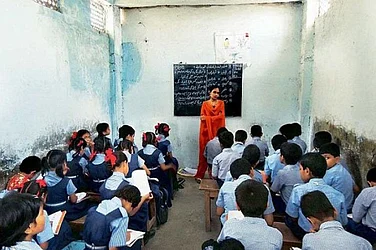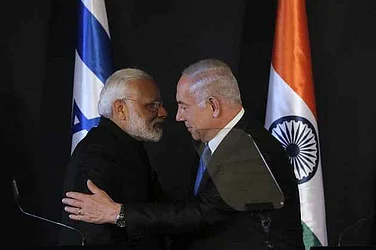Schools in Odisha were abuzz again as offline teaching for classes 1 to 7 resumed on Monday after nearly two years with a week-long rapport-building exercise. The students wore masks, their body temperatures were checked with thermal scanners and sanitisers were applied on their hands as they entered the schools. In some institutions, flower petals were showered on their heads and teachers offered the children chocolates as they stood in queue before going to the classrooms.
"We were waiting for a long time for the schools to open. The kids were getting bored at home," a guardian told reporters in Bhubaneswar. "The children were excited to come to school as they have no interest in attending online classes," she added. Schools had held parents-teachers meetings on Saturday, with a hope for observing positive participation from students on resumption of offline classes.
The government has drawn guidelines, including a week-long rapport building exercise, aimed at creating a stress-free and fun-filled learning environment for the children. The teachers will prepare a fixed timetable on rapport-building exercises, which will include open discussions for sharing good memories during the pandemic, hobbies, how children felt and what were their activities during the school closure period.
"The activities are being done to ensure that the fear a kid may have about going to schools is gone and they come regularly," a teacher said, adding that attendance was beyond her expectations. The schools were closed in March 2020 after the coronavirus pandemic struck. Physical classes for higher classes and other educational institutions had begun earlier.
The government had announced earlier that the schools would open from February 14, but various district collectors sought additional time for undertaking cleaning, bush cutting and minor repairs. They cited the rural elections, due to which many schools would be used as polling stations. Most of the polling personnel consisted of teaching and non-teaching staff of the School and Mass Education (SME) Department. Therefore, the department announced the students would attend physical classes from February 28. Teachers had to come to school from February 14 to ensure proper cleaning and sanitisation.
With PTI Inputs


























